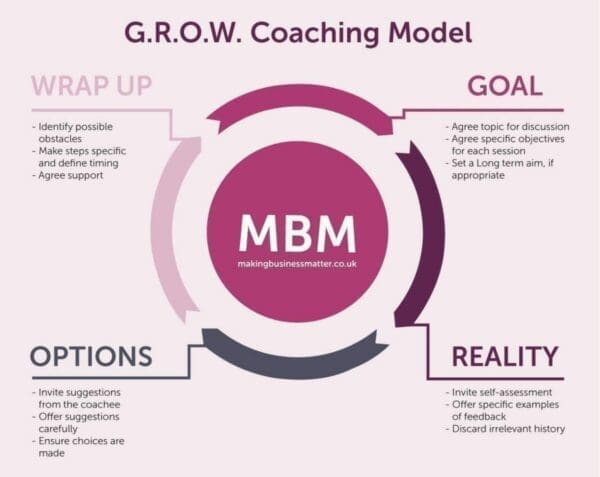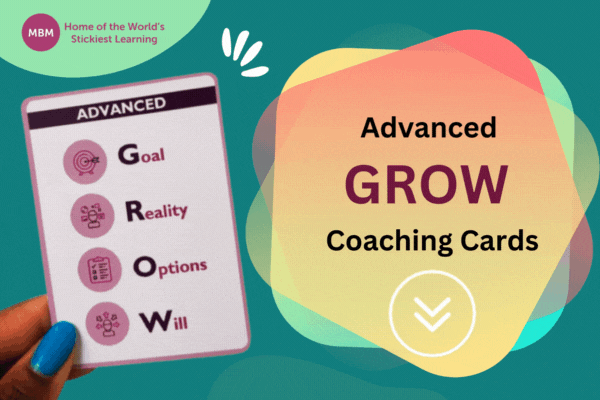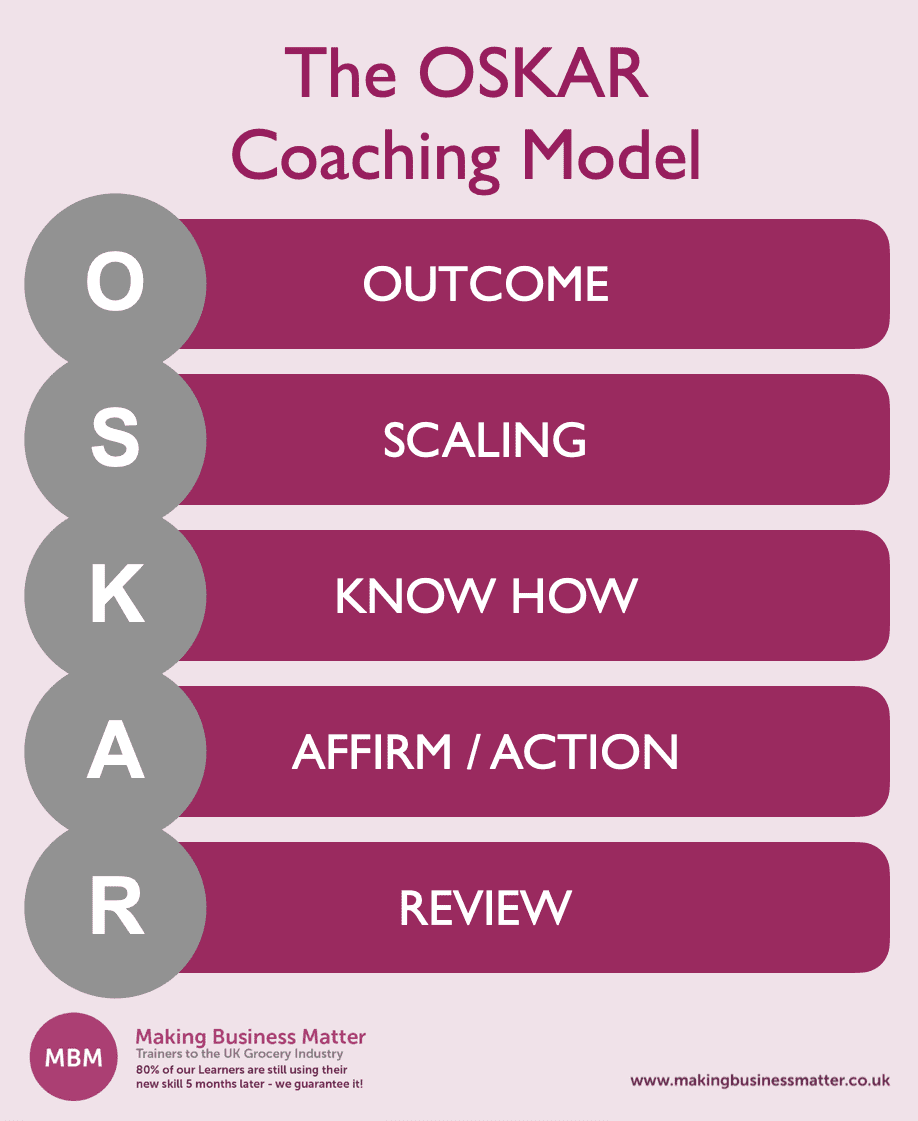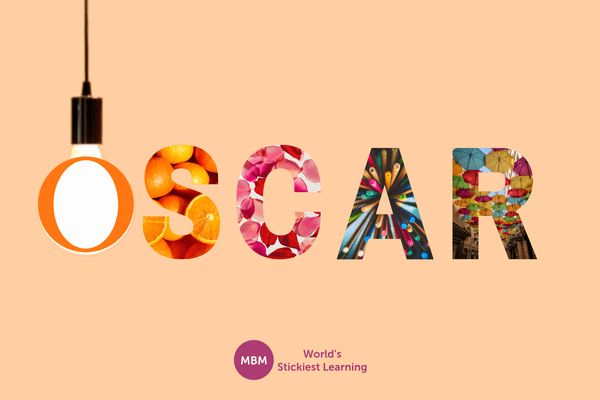Find Out about GROW Coaching Model Effective Questions:
Your role as a leader, quite simply put is to create more leaders. In truth, it’s not rocket science, although sometimes being a people leader/manager of some sort may feel like it. Most of the time though that’s a result of not having the right training at the start of the job as you were promoted.
‘Here’s the job, get on with it, you make great widgets, therefore you must be competent enough to lead those making widgets and get them to make them as fast as you do?’
‘Thanks Boss?!?…. *%$&….. @$£%’
‘You didn’t do so well?’
‘Nope… £$%&’
This is an abbreviated version of the journey, you get the idea.
Two things are at play here which compounds the challenges Firstly, you don’t have the skills. Secodly, the people you’re managing are evolving. Let’s take those 2 apart:
1. You Don’t Have the Skills
You will do as was done unto you. In short, any experience you received will most likely be repeated, and if you’re lucky you’ll be able to comprehend what’s working and what’s not. But your improvement rate will likely be at the same incremental upswing as your yearly ‘cost of living’ salary increase – about 2.5%; slow.
2. The People You’re Managing Are Evolving
New generations have new demands of their leaders. They have different wants and needs and by treating them the same way you were, you’re even further on the back foot, in fact, more than you realise. Why? Because when they leave, the next generation will come in after them, steadily increasing the gap.
In short, a recipe for long-term disaster.
This is where the importance of Coaching truly comes in as the one size fits all solution.
What is Coaching?
As Sir John Whitmore says:
‘Coaching is unlocking people’s potential to maximise their own performance. It is helping them to learn rather than teaching them.’
It’s about helping people raise their awareness so they can take responsibility for the actions they need to take to move forward. But if we’re too busy doing to them as we were done to, lots of telling and dictating how far will our conversation go?

Coaching breaks down into two core elements, Asking Questions and Listening.
Yes, this is super simplified for speed, but at the same time at its deepest roots of skills this is all coaching really is. Moreover asking the right questions and deep listening, and hearing what is truly happening, so the next right question can be asked.
What makes this easier though is having a number of questions, in a specific flow, with an appropriate point to pause in order to digest, reflect and go deeper.
The GROW coaching model does that with a certain amount of long-standing poise and elegance inside the Coaching Leader skillset.
Sticky Learning ® is 7 times more effective than 1-day training courses. Plus, you will get a Chain of Evidence proving your Return on Investment. Discover soft skills training that changes behaviours long term.

What is the GROW Coaching Model?
Still, after 40-years, this model has definitely stood the test of time and used by millions of people in multiple scenarios. Making it probably the most famous of the models for coaching, the ‘GROW’ model.
In particular, it is used by coach’s, businesses, sportspeople, (and now smart parents) worldwide. Indeed, it is the Chicken Tikka Masala of the people development world; popular, loved by most and you know exactly what you are going to get. Clearly structured, easy to move through and around and at the same time super easy to be picked up by someone else as well as track outcomes and ROI. It takes the Rocket Science out of People Management.
What Are the Steps of the GROW Model?
GROW stands for:
- Goal – Where you want to get to
- Reality – the Here & Now
- Options and Obstacles – actions and challenges
- Way forward, Will and Wrap up – Chosen Option/s, test of commitment to the cause and then closing up the conversation
That is honestly that, nothing complicated, or over vexatious. Clear steps, and strategy to deliver.

Why is the GROW Model Effective?
For the Coach; it clearly compartmentalises where the conversation is, and by being in that box, the coach knows what question to ask in order to help their coachee progress.
For the Coachee, the short answer is because of the clear 4-step process, it creates clear outcomes and helps people use the framework so they can track their own results between coaching sessions, if used right it prepares them to mitigate challenges seen and unexpected while still propelling them forward.
With the end result being a progressively uplifting experience as the client or team members upgrade their thinking, based on their own answers and realisations.
How Do You Use Grow Coaching Model?

Let’s deepen the coaching definition and give some scope to build the understanding:
GOAL
To you what does Goal mean? What different ways or words would you use to define Goal? It’s all about the outcome, where you want to get to, where the conversation needs to arrive, a target point. As Stephen R Covey puts it, ‘Begin with the end in mind’.
You’ve got to know where you’re going. Now, it may change as the conversation evolves, and that’s ok, but you need a starting point to anchor the dialogue, otherwise, you’ll drift.
Know where they want to go.
REALITY
What is the current understanding? What are the experiences up to this moment? Consider what has been tried and tested, learned from failures, given up on and shared with others.
It’s the ‘everything’ in the past to now. Without this, the conversation may just skirt over old ideas and not help the coachee to progress and also enable them to come up with excuses or retry old hat concepts and not develop. As much as human beings need to grow, many often have challenges doing it because it feels uncomfortable on the way.
Know where they’ve been.
OPTIONS/ OBSTACLES
What ideas have you got that haven’t been tried before to move forward? What can be done now to change this? What’s next on the imaginary to-do list?
Here is all about fresh ideas and progression, testing the thinking and seeing how far they are willing to push themselves. As new ideas come up, so the Obstacles need to be discussed and mitigated. Otherwise, they just become excuses. What needs to be thought about? Which risks will arise as a result? What needs to be in place to manage the seen and unseen?
Know what the next steps are.
WAY FORWARD
What Option will you choose? What is the next step? Which series of actions do you think will work best from your list here?
This part is now about creating the plan, listing out the activities and making it so, clarifying next steps, listing it out sequentially and then executing.
Know what’s getting done and do it.

>> Advanced Grow Coaching Cards <<
>> Buy on Amazon <<
>> Buy on Etsy <<
What Are Good Coaching Questions?
For sure, many of the seasoned pros, long in the tooth leaders may already know this stuff. The next layer of value we wish to add here for those that have used the GROW model before; effective questions. These can be the difference between a good coaching session and a not-so-good coaching session. A progressive result or a wishy-washy conversation with little to no context. Let’s repeat here, this is because it is all about the right questions to ask. Combined also with the fact that it doesn’t always need to be referenced to the knowledge that the coach has or has not.
As Adrian Moorhouse, the gold medal winner of the 100m breaststroke at the Seoul Olympics said:
‘Brilliant coaches aren’t necessarily successful at doing what they are coaching you to do. My swimming coach couldn’t even swim!’
GROW Model Effective Questions

For each of the 4 stages of the GROW coaching model, we have put together the most ‘Effective Questions You can Use with the GROW coaching Model’:
‘G’ of the GROW Model is for ‘Goal Setting’
- What do you want to achieve in the long term?
- What will it look like, feel like, and sound like when you are there?
- How specific is that goal?
- How will you be able to measure its achievement?
- Is it realistic, given your current activities and workload?
- What time-scale are you going to set for its achievement?
- What might be one or two of the mini-goals/steps you could achieve along the way to reaching this ideal outcome?
- In the time we have now, which of your mini-goals would you like to explore to take you on your way?
- By the time your hand hits the door-handle at the end of the meeting, what would you like to have achieved?
- What would you like to be different when you leave this session?
- What would you like to happen that is not happening now?…and/or what would you like not to happen that is happening now?
- If I could grant you one wish for today’s discussion, what would it be?
‘R’ of the GROW Model is for ‘Reality Checking’
- What is happening right now that makes you want to make this change/makes this an issue for you?
- When/how often does it happen?
- Who is involved or affected – directly? indirectly?
- If things are not going well with regard to this issue, what happens to you? How do you feel?
- Is the quality of any relationship affected – if so, how?
- What about others involved, what happens to them?
- What have you done about this issue/change so far? With what results?
- If you have done nothing so far, what is stopping you?
- What do you have, within you or within the situation, that you are not using?
- What is holding you back? Are their personal, or external, constraints?
‘O’ of the GROW Model is for ‘Option Generation’
- What options do you have for steps to resolve this issue? No matter how wild they are – any options at all – think of as many as possible.
- What else might you try? Not necessarily what you will do, but what you could do.
- Who do you know who handles this sort of thing really well? What do they do that you might try?
- If you could get advice from anyone, anywhere, from whom would you seek it?
- What if you had more time, what would you try?
- What if you had less time – what would that force you to try?
- If you had more energy or confidence – what might you try then?
- What if you had total autonomy – what might you try then?
- What if you had a fresh start – what might you do differently this time?
- Suppose you had a magic wand to help you with this issue/change – what would you ask it to do?
- If you could change one thing in this situation, what would it be?
- Let’s imagine that you really knew the best way forward, what would it be?
- Looking at your list of options, which ones could be made to work?
‘W’ of the GROW Model is for ‘Action Willingness’
- What are you going to do?
- How will this address your goal or move you closer to it?
- When are you going to do it?
- What could get in the way? How will you overcome any obstacles?
- Who needs to know about your plan of action? Who can support you?
- Rate on a scale of 1 – 10 your willingness to take this action.
- How will you stack these options for the best result?
- What’s the one smallest action you can take in the next 24-hours for the biggest possible result?

Find Out How We Can Help You Be the Very Best Version of Yourself With Executive Coaching:
Our coaches are from your industry and can provide coaching on any one of our products, from Negotiation Skills to Category Management to Time Management Skills, using the GROW Model.
Find Out More About OSKAR
Deepen your understanding with the OSKAR coaching model.
What is the OSKAR Coaching Model?
One way to take this further, expand the idea and evolve it is with the OSKAR model, a further way to ensure you have solution-based coaching. The OSKAR coaching Model was developed by Andrew Gilbert & Karen Whittleworth.

The model builds on the GROW model and is particularly useful for managers wanting to broaden their existing coaching style and also add different aspects of questioning not previously thought about.
What Does OSKAR Stand For?
O – Outcome
S – Scaling
K – Know How
A – Affirm/Action
R – Review
What Are Some Examples of OSKAR Questions?

For each of the 5 stages of the OSCAR coaching model we have put together some effective questions:
Outcome
- What is the objective of this coaching?
- What do you want to achieve today?
- Describe the future perfect?
- How will you know this coaching has been useful?
Scaling
- On a scale of 0 – 10 with 10 representing the future perfect and 0 being the worst it has ever been, where are you on that scale today?
- You are at now (n), what did you do to get that far?
- On a scale of 0 – 10 how big is the current problem you’re facing 0 being tiny 10 megalodons proportioned?
- Where would others put you or the situation on the scale?
- What makes you scale it in such a way?
Know How
- What helps you perform at n on the scale and not 0?
- Where does the desired outcome happen for you, even a little bit?
- What do you currently do that works?
- Who else does this well?
- Who could support you?
- What skills need to be learned to bridge this gap and shift the slider?
Affirm/ Action
- How could you do more of what works well?
- What will get you n+1?
- What’s the first thing you could do?
- What is the easiest thing you could do?
- What is the most impactful thing you could do?
Review
- What is working well?
- How could you do more of this?
- What’s better?
- What benefits?
- What else?
Action: For even more useful content on coaching, check out our ultimate guide on Coaching Skills.




